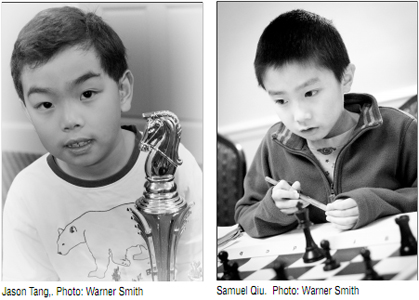 MACA kicked off its 2010-2011 scholastic season with the 1st Qualifier tournament held October 3rd at the Boys and Girls Club in Hudson. (In previous years this tournament was called the Fall Foliage Festival.) Jesse Nicholas won the High School section with 3.5 points out of 4, drawing his game against Vikas Shiva and winning the other three. Michelle Chen and Tian Rossi each scored 3.5-0.5 in the 14 & Under section, with Michelle winning a blitz playoff match to qualify for the finals. Evan Meyer and Samuel Qiu swept the 11 & Under and 8 & Under sections respectively, both scoring 4-0. Brian Reidy, Adam Maimon and Eddie Wang each scored 3-1 in the Novice Under 800 section, with Brian winning the 1st place trophy on tiebreak. Audrey Gaines won the Novice Under 400 section with a 4-0 score. Ken Ballou was the chief tournament director. There were 87 players. MACA kicked off its 2010-2011 scholastic season with the 1st Qualifier tournament held October 3rd at the Boys and Girls Club in Hudson. (In previous years this tournament was called the Fall Foliage Festival.) Jesse Nicholas won the High School section with 3.5 points out of 4, drawing his game against Vikas Shiva and winning the other three. Michelle Chen and Tian Rossi each scored 3.5-0.5 in the 14 & Under section, with Michelle winning a blitz playoff match to qualify for the finals. Evan Meyer and Samuel Qiu swept the 11 & Under and 8 & Under sections respectively, both scoring 4-0. Brian Reidy, Adam Maimon and Eddie Wang each scored 3-1 in the Novice Under 800 section, with Brian winning the 1st place trophy on tiebreak. Audrey Gaines won the Novice Under 400 section with a 4-0 score. Ken Ballou was the chief tournament director. There were 87 players.
The other three qualifiers were all held at the Holiday Inn Select in Woburn, with Alex Relyea as the chief TD at each tournament.
The 2nd Qualifier
The 2nd Qualifier was held on November 14th. Embert Lin won the High School section with 3-1, winning a blitz playoff against Darwin Ding, and Fangru Jiang won the 14 & Under section with 3.5-0.5, winning a playoff against Nicholas Plotkin. There were two perfect scores in the 11 & Under section; Michael Isakov won the playoff vs. Sandeep Vadlamudi. Justin Lin was the only player to score 4-0 in the 8 & Under section. Xerxes Patel, Eddie Wang, James Cassidy, and Ansh Jetly all scored 3-1 in the Novice Under 800 section, with Xerxes winning 1st on tiebreak. Nikita Roldan-Levchenko swept the Novice Under 400 section 4-0. There were 95 players.
The 3rd Qualifier
At the 94-player 3rd Qualifier, held on December 5th, Vikas Shiva won the High School section with 3.5-0.5, getting a full point bye in the last round. There were only three players left in the section when a player withdrew after the first round, and the other two players had already received byes. There was a three-way blitz playoff in the 14 & Under section, Timothy Lung winning against Charlie Fauman and Jesse Klimov. All three players scored 3.5-0.5. Arnav Ghosh also scored 3.5-0.5 in the 11 & Under section and won clear first; his only draw was against Tal Puhov. Eric Feng swept the 8 & Under section with 4-0. Jeremy Tang won the Novice Under 800 section with 3.5-0.5, and Tyler Saklad scored 4-0 in the Novice Under 400 section.
The 4th Qualifier
The 4th and final Qualifier was held on January 9th. Eliot Strassman won the 3-player High School Section with 3-1. He scored 1-1 against Darwin Ding, won his game against Jacob Fauman, and got a full point bye. Jesse Klimov and Amanda Chen each scored 3.5-0.5 in the 14 & Under section, with Jesse winning the blitz playoff. Anton Barash went 4-0 in the 11 & Under section. Rohan Krishnan scored 3.5-0.5 in the 8 & Under section, winning a playoff against Andrew The. James Cassidy and Gershon Gilman both scored 3.5-0.5 in the Novice Under 800 section, James winning 1st on tiebreak. Daniel Wang won the Novice Under 400 section with 3.5-0.5, drawing against Nikhil Datta and winning his other games. There were 102 players.
The Holiday Team Challenge
The Holiday Team Challenge, held January 23rd at the Holiday Inn in Boxborough, drew 23 teams and 96 players. Sage A (Nicholas Plotkin, Bary Lisak, Kevin Hu, and Eric Hu) won all their matches to win the K-12 section. The other two winning teams each drew their match in round one and won the other three: Winchester Chess Club (Mateos Sahakian, Conway Xu, Christopher Wang, and Justin Lin) in the K-6 section and Three Boys and a Girl (Carissa Yip, Rohan Krishnan, Matthew Ding, and Maxwell Wang) in the K-3 section. The chief TD was Bob Messenger.
Barry S. Spiegel Cup
Finally, the Barry S. Spiegel Cup, the invitational Massachusetts scholastic championship, was held at the Holiday Inn Select in Woburn. There were 10 players in each section: the six highest rated players in that age group plus the winners of the four qualifiers. Andrew Wang swept the High School section 4-0, winning an invitation to represent Massachusetts at the Arnold Denker Tournament of High School Champions in August. Grant Xu won the 14 & Under section with a 3.5-0.5 score and will be invited to play in the new K-8 Tournament of State Champions, also in August. Alex Fauman won the 11 & Under Section with a perfect 4-0 score, while Jason Tang won the 8 & Under section with 3.5-0.5. Brian Mottershead was the chief tournament director.
In addition to Ken Ballou, Alex Relyea, Bob Messenger and Brian Mottershead, Nita Patel, Steve Frymer, George Mirijanian, Stephen Dann, Beebe Wiegand and Brian Laffety also assisted at one or more of these tournaments. For further details see the tournament reports and crosstables on the MACA web site, www.masschess.org. Congratulations to all of the winners, and especially to our state champions: Andrew Wang, Grant Xu, Alex Fauman, and Jason Tang!
(2) Evan Meyer (1241)
Michael Isakov (1243)
[D35] Queen's Gambit Declined
1st Qualifier, 11 and Under (4)
[Steve Frymer & Bob Messenger]
1.d4 d5 2.c4 e6 3.Nc3 Nf6 4.Bg5 Nbd7 5.cxd5 exd5 6.e3 [A trap! 6.Nxd5?? Nxd5! 7.Bxd8 Bb4+ wins!] 6...c6 7.Nf3 Be7 8.Be2 [8.Bd3 looks more in line with aggressive play.] 8...h6 9.Bh4 0-0 10.0-0 c5 This allows an isolated pawn, which White declines. 11.Ne5 c4? 12.f4? [White could have won a pawn with 12.Nxd7 Bxd7 (or 12...Qxd7 13.Bxf6 Bxf6 14.Bf3 and Black can't defend the d-pawn) 13.Bxf6 Bxf6 14.Nxd5 (Fritz)] 12...Nb6 13.g4 Nfd7 14.Bxe7 Qxe7 15.Rf3 Drops a pawn but gives White an attacking position. 15...Nxe5 16.dxe5 Bxg4 17.Rg3 Bxe2 18.Qxe2 Qe6 [Better was 18...f6 challenging White's pawn center and allowing the queen to defend g7] 19.Qg2 g6 Black must defend carefully. 20.Kh1 Kh7 21.Rg1 Rg8 22.h4 h5? [This creates a nasty hole at g5. Better is 22...a6 and if 23.h5 Qf5 allows Black to hold the position] 23.Ne2 Qe8 24.Nd4 Rd8 (D)
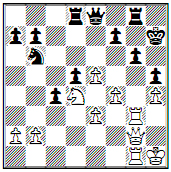
25.f5? [Instead of giving up the e-pawn White should have played 25.Rg5 threatening 26.Qf3 and 27.Rxh5+!] 25...gxf5?? [A blunder, missing White's winner. After 25...Qxe5 26.fxg6+ fxg6 27.Rxg6 Qe4 Black would have forced the exchange of queens, killing White's attack and leaving Black a pawn up in the endgame.] 26.Rg7+ Kh8 27.Qg5 f6 28.Qh6# 1-0
(4) Michelle Chen (1917)
Siddharth Arun (1841)
[B24] Sicilian Defense
1st Qualifier, 14 and Under (3)
[Steve Frymer]
1.e4 c5 2.Nc3 Nc6 3.g3 g6 4.Bg2 Bg7 5.Nge2 d6 6.d3 Nf6 7.Be3 Bd7 [7...Ng4 was an alternative.] 8.h3 0-0 9.0-0 Qc8 10.Kh2 Rb8 11.Qd2 b5 12.a3 a6 13.f4 Ne8 14.f5 Ne5 15.Nd5 Qd8 16.Bh6 Bc6 17.Bxg7 Kxg7 18.Ne3 Nf6 19.Nf4 Bd7 20.Nfd5 Bc6 21.Rf4 Bxd5 22.Nxd5 Nxd5 23.exd5 g5 [23...Qb6 to generate queenside play is suggested.] 24.f6+! Very nice. White sacrifices a pawn for enduring pressure. 24...exf6 25.Rf5 h6 26.Raf1 Nd7 27.Be4 b4 28.h4 bxa3 29.bxa3 Qe7 30.Qc3 Ne5 31.Kg2 Ng4 32.Qd2 Rb2 33.Kh3 Ne5 34.Qf2 Nd7 35.Qd2 (D)
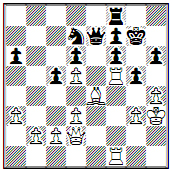
Qd8? Black has a choice between 35...Rfb8 and 35...Ne5. The move played gives White material. 36.Qc3 Rb5 37.hxg5 hxg5 38.Rxg5+ Kh6 39.Rg4 Rg8 40.Rxg8 Qxg8 41.Rxf6+! An Exchange sac which leads to mate! Black declines but to no avail. 41...Kh5 [If 41...Nxf6 42.Qxf6+ Kh5 43.Qh4#!] 42.Rf5+ Kg6 43.Rf4+ f5 44.Bxf5+ A very mature and solid performance by Michelle Chen. 1-0
(1) Justin Lin (848)
Justin Wu (813)
[C02] French Defense
2nd Qualifier, 8 and Under (4)
[Steve Frymer & Bob Messenger]
1.e4 e6 2.d4 d5 3.e5 c5 4.Nf3 [4.c3 to maintain the pawn chain is the most common, but 4.Nf3 is also a book move.] 4...cxd4 5.Nxd4 [White can can try for an advantage with 5.Bd3!? , sacrificing a pawn.] 5...Nc6 6.Nf3 [Instead of losing time by retreating his knight White should exchange it off with 6.Nxc6 ] 6...Qc7 7.Bb5 Qa5+ 8.Nc3 Bb4 9.Rb1?? Losing a piece because of the pin on the knight. [White should have played 9.Bd2 and if 9...Bxc3 10.Bxc6+ saves the bishop] 9...Bxc3+? [This wins a pawn, but it was better to capture the bishop: 9...Qxb5 White can't recapture because his knight is pinned.] 10.bxc3 Qxc3+ 11.Bd2 Qc5 12.0-0 Bd7 13.Be3 Qf8? [Not the best burying one's Queen. 13...Qa3 is necessary.] 14.Qd2 f6 15.Rfd1 fxe5 16.c4?! [An aggressive move to open up Black's center and take advantage of Black's misplaced Queen, but it was better to recapture the e-pawn with 16.Bxc6 Bxc6 17.Nxe5] 16...Nf6 [Black should have played 16...e4 leaving him two pawns up. If 17.cxd5 exd5 18.Qxd5? Black wins the knight by playing 18...Nf6 (an attack-defense move: attacking the queen and defending the bishop on d7 and the pawn on e4) followed by 19...exf3] 17.Bg5 Ne4 18.Qd3 (D)
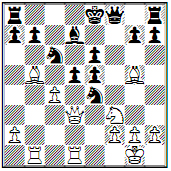
Nb4?? [This loses material. Better was 18...Nc5 with only a slight advantage to White] 19.Rxb4 [Better was 19.Bxd7+ Kxd7 20.Qxe4 winning a piece because of the pin on the d-file] 19...Qxb4 20.Bxd7+ Kxd7 21.cxd5? [Missing 21.Qxe4 which would have given White two pieces for a rook instead of leaving him the exchange down. Even after this mistake White still has the advantage because of his attacking chances against Black's king.] 21...Nxg5 22.dxe6+? [It was tempting to put Black into double check, but better was 22.Nxg5 when White would have the advantage despite being the exchange down.] 22...Kxe6? [A better defensive move was 22...Ke7! after which the best White could do was to draw by perpetual check after 23.Qd7+ (23.Nxg5? Rad8 kills White's attack by controlling the d-file) 23...Kf6 24.Nxg5 Kxg5 25.Qxg7+ After 22...Kxe6? White has a winning attack.] 23.Nxg5+ [Better was 23.Qd5+ Ke7 24.Nxg5] 23...Ke7 [Better was 23...Kf6 although White would still be winning after 24.Ne4+] 24.Qd7+ Kf6 25.g3! (D)
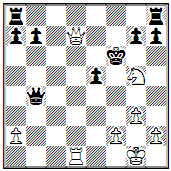
Offering a piece for a mating attack, which Black declines for now but accepts a move later. [25.Rd6+! (Fritz) would have forced checkmate in a few moves.; 25.h4 was also good.] 25...Rhd8 [If 25...Kxg5 26.Qxg7+ Kf5 (or 26...Kh5 27.Qxe5+ Kg6 28.Qe6+ Kg7 29.Rd7+ Qe7 30.Rxe7+ Kf8 31.Qf7#) 27.Qf7+ Ke4 28.Qd7 and Black has to give up his queen to stop the checkmate] 26.Qf7+? [The right move was 26.Qe6+ Kxg5 27.h4+ either checkmating Black or winning his queen.] 26...Kxg5 27.h4+? [White should have played 27.Qxg7+ with a draw by perpetual check: 27...Kh5 28.Qxh7+ Kg5 29.h4+ Kf6 (not 29...Kg4?? 30.Kg2!) 30.Qh6+ Kf7 31.Qh7+ Kf6 32.Qh6+ etc.] 27...Kg4?? [Walking into checkmate. After 27...Kh6! Black's king would be safe and he'd be a rook ahead with a winning position.] 28.Kg2! There is no defense. A great attacking effort by the winner, despite mistakes made by both players. 28...Qe4+ 29.f3+ 1-0
(3) Michael Isakov (1243)
Max Bennett (873)
[E61] King's Indian Defense
2nd Qualifier, 11 and Under (1)
[Steve Frymer]
1.d4 Nf6 2.c4 g6 3.Nc3 Bg7 4.Nf3 Nc6 Provocative! Better that the cpawn be moved to c6 or c5. 5.Bg5 [5.d5 immediately seems more enterprising.] 5...d6 6.d5 Ne5 7.Nxe5 dxe5 8.e4 e6 9.Be2 0-0 10.0-0 c6 11.dxc6 Qxd1 Better to not concede control of the d-file. 12.Rfxd1 bxc6 13.Rd6 Bb7 14.Rad1 c5 15.f3 Rfe8 [Black should challenge f5 immediately with 15...h6 ] 16.Na4 (D)
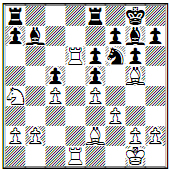
Bxe4 In desperation Black tries a combination. 17.Bxf6 Bc2 18.R1d2 Bxa4 19.Bxg7 Kxg7 20.b3 Trapping the Bishop. White won in 41 moves. 1-0
(1) Embert Lin (1966)
Jacob Fauman (1978)
[B33] Sicilian Defense
Barry S. Spiegel Cup, High School
Waltham, Mass. (2)
[Jacob Fauman]
1.e4 c5 I've recently started playing the Sicilian, abandoning my beloved French. Several people have congratulated me for starting to play a "real opening." 2.Nf3 e6 3.d4 cxd4 4.Nxd4 Nf6 5.Nc3 Nc6 6.Ndb5 d6 7.Bf4 e5 8.Bg5 a6 9.Na3 b5 10.Nd5 Be7 11.Bxf6 Bxf6 12.c3 0-0 13.Bd3 Up until now, everything has been played according to the book. This move may be a slight inaccuracy. Correct is 13. Nc2 Rb8 when 14. g3, 14. Bd3, 14. Be2, and 14. h4 all offer good chances for both sides. 13...Be6 Trying to take advantage of the fact that the white bishop is blocking the queen, so Nxf6 can now be met by Qxf6. However, 13...Bg5 14.Nc2 Ne7 was also worth considering. 14.Nc2 Bxd5 15.exd5 Ne7 16.Ne3?! (D)
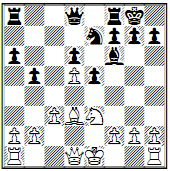
The knight is awkwardly placed here and could potentially lose an important tempo after f7-f5-f4. 16...g6 This move has the idea of retreating the bishop and rolling the f-pawn. However, stronger was 16. ..Bg5!, when the mobile black b-, e-, and f-pawns will cause serious problems for White. [Better is 16...Bg5! 17.Qh5 h6 18.Qf3 Qb6 19.Nf5 Nxf5 20.Bxf5 g6 21.Bc2 b4=/+] 17.h4 Now that Black has weakened his kingside, White starts to attack. 17...b4!? They say the best remedy to a flank attack is activity in the center, so the idea behind this pawn sac is to initiate a tactical sequence that will open the game in Black's favor. However, simple and strong was the calm 17...Bg7 18. h5 f5 19. hxg6 hxg6, when Black's strong pawn center seems to slightly outweigh White's attack down the h-file. 18.c4?! This move hands the advantage to Black; White should accept the pawn sacrifice, leading to an unclear game. Possibly White missed Black's tactical idea. [Better is 18.cxb4 e4 19.Bxe4 Bxb2 20.Rb1 Bc3+ 21.Kf1 Rb8 (21...f5? fatally weakens the g6 and e6 squares. 22.Bf3 f4 23.Nc4 Rb8 24.h5 Bxb4 25.Bg4+/-) 22.h5 Rxb4 23.Rxb4 Bxb4 unclear] 18...e4! Suddenly, Black's pieces become active. 19.Bxe4 Bxb2 20.h5!? After 20. Rb1, I had calculated that 20... Bc3+ 21.Kf1 f5 22. Bd3 h5!? stops any White counterplay and maintains Black's space advantage. This move complicates things. 20...f5 21.hxg6 The only consistant way to play. 21...fxe4? Over the board, I had calculated a tactical sequence that seemed to refute the piece sacrifice. However, Rybka's analysis shows that accepting the piece sacrifice leads to a loss for Black. 22.Qh5 Bc3+ 23.Kf1 h6 This is the move that I had pinned my hopes on. If White captures the pawn with 24. Qxh6, then 24...Rxf2+ 25. Kxf2 Qf8+ 26. Qxf8 Rxf8+ 27.Ke2 Bxa1 28.Rxa1 Nxg6 leads to a better endgame for Black. 24.Rb1? This move lets Black consolidate. The winning continuation was 24. Qxh6! Rxf2 25. Kg1!! Bxa1 26. Qh7 Kf8 27. Kxf2 Bg7 28. Rf1! and Black cannot hold on to the extra piece, or even his king. 24...Bg7-+ Now Black is simply winning. White cannot increase the pressure on the h6 pawn with 25. Ng4 because 25... Nf5 defends with the crushing threat of 26...Ng3+. 25.Qg4 Qc7 26.Rh5 Rae8 27.Qxe4?? Simply dropping more material. 27...Nf5 28.Qxf5 Rxf5 29.Rxf5 Rf8 30.Rh5 Qc5 31.Rc1?? A final blunder at the end of a long game seals White's fate 31...Qxe3 0-1
(2) Alex Fauman (1662)
Jeffrey Yao (1799)
[C13] French Defense
Barry S. Spiegel Cup, 11 & Under
Waltham, Mass. (3)
[Alex Fauman]
This was round 3 of the Spiegel Cup, 11 and under section. Jeffrey was the highest rated player in the section, and I was number two. I had the only perfect score at this point; Jeffrey had one and a half points. 1.d4 d5 2.Nc3 Nf6 3.Bg5 e6 4.e4 dxe4 5.Nxe4 Be7 6.Nxf6+ Bxf6 I've been in this position of the Veresov opening many times before. 7.Bxf6 Qxf6 8.Nf3 0-0 9.Bd3 Nc6 10.Qd2 Re8 [It looks like the d4 pawn is free, but it can't be captured because of: 10...Nxd4 11.Nxd4 Qxd4 12.Bxh7+ Kxh7 13.Qxd4] 11.0-0-0 Ne7 12.c3 Nd5 13.Qg5 Offering a trade of queens 13...Qxg5+ 14.Nxg5 h6 15.Nf3 Nf4 Black's fork forces a trade of the knight for the bishop, setting up a knight vs bishop showdown in the endgame 16.g3 Nxd3+ 17.Rxd3 b6 18.Re1 prevents the f3 knight from getting pinned 18...Bb7 19.Nd2 c5 20.Nc4 cxd4 (D)

21.Red1? I thought I saw a possible backrank mate opportunity here, which is why I didn't immediately recapture the pawn. However, my tactic doesn't work because the king can escape to h7. 21...Rad8 [21...dxc3 22.Nd6 Re7 23.Nxb7 Rxb7 24.Rd8+ Rxd8 25.Rxd8+ Kh7 26.bxc3] 22.Rxd4 Rd5 23.Nd6 Rxd4 24.Rxd4 Rb8 25.Ra4 I moved Ra4 because it weakens the a and b pawns. 25...a5 26.Rd4 Bc6 27.Kd2 Kf8 28.Ke3 Ke7 29.Ne4 Rb7 30.Nd6 Rd7 Rd7 is a mistake because it allows me to exploit the weakness I made on b6. 31.Nc8+ Ke8 32.Rxd7 Kxd7 33.Nxb6+ Kc7 34.Nc4 a4 35.Ne5 Be8 36.b3 I went b3 because I did not want him to get a passed pawn. 36...axb3 37.axb3 f6 38.Nd3 Kd6 39.f4 g5 40.Kd4 I went Kd4 because I wanted to stop e5. 40...Bf7 41.b4 h5 42.h4 g4 43.Ke4 I went Kd4 to see if he would let me move f4. 43...Bg6+ 44.Kd4 Bf7 45.c4 Be8 46.b5 Bd7 47.c5+ Kc7 48.b6+ Kc6 49.Nb2 I went Nd2 so I could move Nc4 to Nd6. 49...Bc8 50.Nc4 Black resigns. 1-0
(3) Eliot Strassman (1996)
Zaroug Jaleel (2107)
[B90] Sicilian Defense
Barry S. Spiegel Cup, High School
Waltham, Mass. (3)
[Elliot Strassman]
I came into this third round game with an even score after two games as Black, and I was happy to finally get the white pieces. 1.e4 c5 2.Nf3 d6 3.d4 cxd4 4.Nxd4 Nf6 5.Nc3 a6 6.Be3 e5 7.Nb3 Be6 8.f3 Be7 9.Qd2 0-0 10.0-0-0 Nbd7 11.g4 b5 12.g5 b4 13.Ne2 Ne8 14.f4 a5 15.f5 Bxb3 [15...a4 is another main line.] 16.cxb3 a4 17.bxa4 Rxa4 18.b3 [In my first game in this line I had played: 18.Kb1 Rxa2 19.Kxa2?! (19.Nc1) 19...Qa8+ 20.Kb1 (Rybka suggests: 20.Kb3) 20...Qxe4+ with complicated play that is probably better for Black.] 18...Ra5 19.Kb1 This was as much as I remembered from home preparation. 19...Qa8 20.Ng3 Nc5 (D)
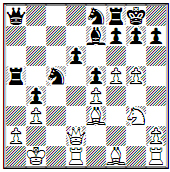
21.Bxc5? [I wanted to keep my bishop pair with 21.Qc2 but Black can take on b3 anyway: 21...Nxb3 22.Qxb3 Ra3 wins the piece back; 21.f6! is Rybka's suggestion, and definitely best, but I didn't see the idea behind it: 21...gxf6 22.Bxc5 Rxc5 23.Nf5! Qa7 24.gxf6 Bxf6 25.Rg1+ Kh8 26.Qh6 Rg8 27.Rxg8+ Kxg8 28.Rd2+-] 21...dxc5? [I didn't see the strength of this in-between move during the game, but I needed to act immediately with 21.f6 because of: 21...Bxg5! 22.Qxg5 Rxa2 when, according to Rybka, White has to settle for at best a perpetual] 22.Bc4? [22.f6! gxf6 23.Nf5+- is similar to the 21.f6 line, except now the d-file is open: 23...Qa7 24.gxf6 Bxf6 25.Rg1+ Kh8 26.Qh6 Rg8 27.Rxg8+ Kxg8 28.Qxf6+-] 22...Nd6? [22...Bxg5 is still strong] 23.Bd5 Qa6 24.f6 Bd8 [If 24...gxf6 25.gxf6 Bxf6 26.Nh5 is complicated, but White is winning - for example: 26...Nb5 27.Rhg1+ Kh8 28.Qh6 Nc3+ 29.Kc1 I missed the next move in my calculations when I had played f6, but White can escape: 29...Ne2+ 30.Kd2 Rxa2+ 31.Ke3+- and Black runs out of checks.] 25.fxg7 Kxg7 26.Nf5+ Nxf5 27.exf5 f6 28.Bc4 Qa7 29.Qd7+ Be7 [29...Qxd7 30.Rxd7+ Kh8 31.g6! and mate is unavoidable.] 30.gxf6+ Rxf6 31.Rhg1+ Kh6 32.Qd2+ This tactical battle was difficult for both sides because of the time control, but I think in general White had the easier game after ...Bxb3. 1-0
(4) Mika Brattain (2132)
Grant Xu (2096)
[E42] Nimzo-Indian Defense
Barry S. Spiegel Cup, 14 & Under
Waltham, Mass. (4)
[Grant Xu]
 This was the crucial last round of the Spiegel Cup, with both Mika and me at 2.5 points. Whoever won this game would take the championship title. 1.d4 e6 2.c4 Nf6 3.Nc3 Bb4 The Nimzo-Indian. 4.e3 Rubinstein Variation. 4...c5 5.Nge2 0-0 6.a3 Bxc3+ 7.Nxc3 cxd4 8.exd4 d5?! Dubious. Now White gets a massive bind on the queenside. 9.c5 b6 10.b4 [This position has actually been seen before in Conquest,S - Gormally,D Hastings 2004, when play continued with: 10.Be2 bxc5 11.dxc5 Ba6 12.0-0 Bxe2 13.Qxe2 Nc6 14.b4 White has a pleasant majority on the queenside and eventually won, albeit not without difficulty.] 10...a5? A move that should have cost me the title. 11.Bf4? [11.b5! White's pawns are nearly unstoppable and it will be extremely difficult to free himself and develop counterplay: c6 is looming and Bf4 looks very strong here as well; but now Black plays actively for an advantage.] 11...axb4 12.axb4 Rxa1 13.Qxa1 Nc6 14.Na2 [Too passive. Much better would have been 14.Bd6 Re8 15.Nb5 e5 (15...Nxb4? 16.Qa4) 16.dxe5 Ne4 17.Be2 Nxd6 18.Nxd6 Rxe5 19.Nxc8 Qxc8 20.b5 Qe8 21.0-0 unclear] 14...bxc5 15.dxc5 [15.bxc5 Qa5+ 16.Bd2 Qa4-+] 15...e5 16.Bg5 Nd4 (D) This was the crucial last round of the Spiegel Cup, with both Mika and me at 2.5 points. Whoever won this game would take the championship title. 1.d4 e6 2.c4 Nf6 3.Nc3 Bb4 The Nimzo-Indian. 4.e3 Rubinstein Variation. 4...c5 5.Nge2 0-0 6.a3 Bxc3+ 7.Nxc3 cxd4 8.exd4 d5?! Dubious. Now White gets a massive bind on the queenside. 9.c5 b6 10.b4 [This position has actually been seen before in Conquest,S - Gormally,D Hastings 2004, when play continued with: 10.Be2 bxc5 11.dxc5 Ba6 12.0-0 Bxe2 13.Qxe2 Nc6 14.b4 White has a pleasant majority on the queenside and eventually won, albeit not without difficulty.] 10...a5? A move that should have cost me the title. 11.Bf4? [11.b5! White's pawns are nearly unstoppable and it will be extremely difficult to free himself and develop counterplay: c6 is looming and Bf4 looks very strong here as well; but now Black plays actively for an advantage.] 11...axb4 12.axb4 Rxa1 13.Qxa1 Nc6 14.Na2 [Too passive. Much better would have been 14.Bd6 Re8 15.Nb5 e5 (15...Nxb4? 16.Qa4) 16.dxe5 Ne4 17.Be2 Nxd6 18.Nxd6 Rxe5 19.Nxc8 Qxc8 20.b5 Qe8 21.0-0 unclear] 14...bxc5 15.dxc5 [15.bxc5 Qa5+ 16.Bd2 Qa4-+] 15...e5 16.Bg5 Nd4 (D)
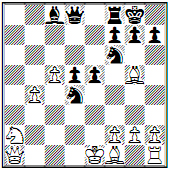
17.Bd3?! [Possibly the losing move. White could have made it a fight with 17.Qb2 Bf5 18.Be2 Nc2+ (after 18...Nxe2 19.Qxe2 White is perfectly fine) 19.Kf1-/+] 17...Ba6! 18.Qb1 Bxd3 19.Qxd3 Qa8 20.Nc1 The only move. [20.Nc3 Qa1+ 21.Nd1 Qa4] 20...Qa4 21.0-0 Qxb4 22.Bxf6 [More resistance could have been put up with: 22.Qg3 Ne4 23.Qxe5 Nxg5 24.Qxg5 Qxc5 25.Nd3] 22...gxf6 23.Qa6 Kg7 24.Qd6 Qc4 25.f4 Nf5 26.Qd7 Qxc5+ 27.Kh1 Qc8 28.Qxc8 Rxc8 29.fxe5 fxe5 30.Nd3 From here it's simply a conversion of the extra material. 30...e4 31.Ne5 Nd6 32.Kg1 d4 33.Rd1 d3 34.Nxd3 exd3 35.Rxd3 Ne4 36.g3 Rc2 37.Re3 Ng5 38.h4 Ne6 39.Rf3 Nd4 40.Re3 Re2 41.Rd3 Nf5 42.Kf1 Re3 43.Rd5 Nxg3+ 44.Kf2 Ra3 45.Rd4 Nf5 46.Rf4 Kf6 47.Ke2 Rh3 48.Ra4 Rxh4 49.Ra8 Kg5 Black won in a couple of moves. 0-1 |